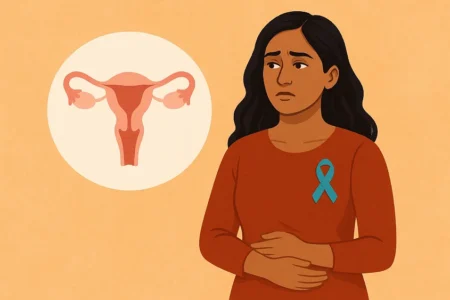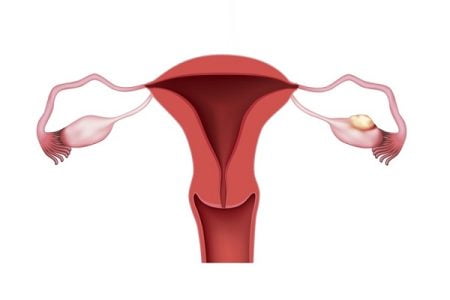Ovarian Cancer Pain: Understanding and Treating It
- Updated on: Jul 13, 2024
- 5 min Read
By
- Published on Oct 3, 2019


Ovarian cancer
Ovarian cancer refers to a condition of the ovary (two female reproductive glands that produce eggs and female hormones estrogen and progesterone) in which the abnormal cells in the ovary begin to multiply in an uncontrollable manner eventually forming a tumor. If the condition is left untreated, it can affect other parts of the body by spreading.
More: Ovarian Cancer: Causes, Symptoms, Stages, Diagnosis, Treatment
Ovarian cancer side effects and symptoms
Ovarian cancer can be a deadly cancer as it’s generally hard to detect it early. It is usually detected in later stages when there is no cure for it. In the past, ovarian cancer was called “the silent killer” because many women didn’t experience any signs or symptoms until the disease had spread to other organs.
The symptoms of ovarian cancer are very common and similar to many other illnesses which tend to come and go on their own. Therefore, distinguishing the symptoms of ovarian cancer from other women problems is very difficult, and it’s easy to overlook the early symptoms of ovarian cancer by women.
While the symptoms of ovarian cancer can be hard to notice and differentiate from other conditions, but ovarian cancer isn’t completely silent. Most women feel changes such as bloating, changed in bowel movements, an increased urge to urinate. One of the most common sign of an ovarian cancer is pain. Women usually feel pain in the stomach, side, or in the back.
Some of the early symptoms and warning signs of ovarian cancer may include:
- Pressure and pain in the abdomen
- abnormal bloating and fullness after eating
- difficulty eating
- Increase and more frequent urination
- An increased urge to urinate
Ovarian cancer can also show some other symptoms in the later stages, such as:
- fatigue
- indigestion
- heartburn
- pain from ovarian cancer at different locations of the body
- constipation
- back pain
- menstrual irregularities
- painful intercourse
- dermatomyositis (a rare inflammatory disease that can cause skin rash, muscle weakness, and inflamed muscles)
These ovarian cancer symptoms are very common and may occur at one or other time to any women but if the symptoms persist, then they may sometimes be due to ovarian cancer. Symptoms usually become more severe as the tumor grows. In later stages of the ovarian cancer, the symptoms worsen. By this time, the cancer has usually spread outside of the ovaries making it harder to treat the tumor effectively.
More: Coping With Cancer Treatment
Pain from ovarian cancer: Where do you feel ovarian pain in cancer?
A patient with ovarian cancer suffers from extreme pain which may be experienced at different locations in the body. The ovarian cancer pain may include such as:
- sharp pain in the ovary
- left ovary pain
- right ovary pain
- leg pain
- lower back pain
- abdomen pain
The pain may be due to the cancer itself or as a side effect of cancer treatment. People with advanced ovarian cancer are more likely to have severe pain. Ovarian cancer pain may result from:
- A tumor in the ovary which puts pressure on tissues, bones, nerves and organs nearby
- Poor blood circulation as the blood vessels get blocked due to the cancer
- Blockage of an organ or tube in the body like the kidneys or bladder
- Side effects of the various treatments of cancer which may include surgery (causes soreness and discomfort), radiation therapy, chemotherapy (causes pain and burning in the arms, legs, hands and feet) or other treatments
- Metastasis, or cancer cells that have spread to other locations in the body
Why does ovarian cancer cause pain?
The tumor puts pressure on your organs, nerves, bones, and muscles. This pressure causes pain. The more the cancer spreads and the larger the tumor is, the more severe and consistent the pain becomes. In advanced stages such as in stage 3 and 4 ovarian cancers, pain often is the main symptom of ovarian cancer.
Sometimes, the ovarian cancer pain can develop as a result of treatments that are given to control the growth of the tumor. Such treatments that can cause pain as a side effect may include such as chemotherapy, surgery, or radiation therapy. Chemotherapy can cause pain in the arms, legs, hands, and feet. Chemotherapy may also leave painful sores around your mouth.
Surgery for ovarian cancer can cause pain and soreness that can stay for up to a few weeks after the procedure. Treatment-related pain however improves after the therapy is stopped unlike the cancer pain which worsens with time.
Understanding your pain
In order to understand your pain better and provide pain relief measures, your docor may ask questions such as:
- How intense is the pain?
- Is it persistent or changes with time? Does it come and go on its own?
- What seems to trigger your pain or worsen it?
- Where do you feel the pain? Which locations are most affected with it?
- When does the pain occur?
- How do you rate your ovarian cancer pain on a scale of 1 to 10, with 10 being the most severe?
Treatment: Managing Ovarian Cancer Pain
Often, the main objective of delivering treatment therapies for ovarian cancer is to prolong your life and provide relief from the symptoms particularly the pain.
Sometimes, surgery is done to control the growth of cancer and help you relieve from the pain. Chemotherapy and radiation therapy also eventually help you feel better.
Your doctor also can give you medicine to control cancer pain. He or she will know which pain reliever you should take first based on how severe your pain is.
If you have mild pain, you may get an over-the-counter analgesic such as acetaminophen (Tylenol). You can also be given an NSAID such as aspirin or ibuprofen. NSAIDs help relieve pain and also reduce the inflammation in your body. But there are some side effects too such as damage to the stomach or liver.
If your ovarian cancer pain is more severe, the doctor may give you opioid medicine such as morphine. These drugs can cause side effects such as:
- Confusion
- Constipation
- Sleepiness
- Nausea and vomiting
- Addiction
Nerve block to control ovarian cancer pain
Another option for pain relief is a nerve block based on where the pain from ovarian cancer is located. Pain medicine is injected directly into a nerve or into the space around the spine for fast and long-lasting relief from pain due to ovarian cancer.
Sometimes, doctors also recommend antidepressants, anti-seizure medicines, and steroids for pain relief. You should talk to your doctor to know which pain reliever is best for your kind of pain.
If the pain is too severe and medicine doesn’t help, the last option is to cut nerves during surgery so you no longer feel the pain in those areas.
Alternative options for ovarian cancer pain relief
Your doctor may recommend alternative treatment options for pain relief. These may include such as:
- Acupuncture
- Deep breathing exercises
- Distraction (imagery): involves distracting you from the pain by making you focus on a nice thought or image.
- Aromatherapy
- Massage
- Meditation












